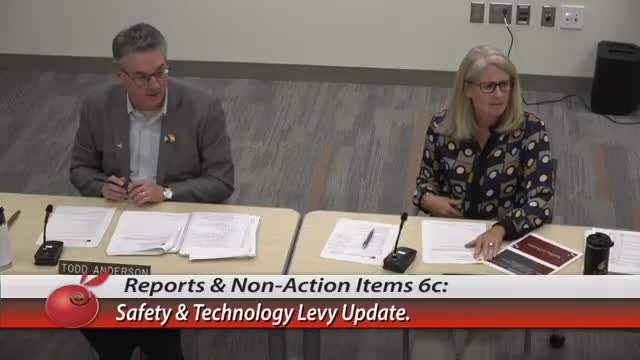Roseville school leaders ask voters for $6 million a year levy to fund safety, cybersecurity and technology
September 26, 2025 | ROSEVILLE PUBLIC SCHOOL DISTRICT, School Boards, Minnesota
This article was created by AI summarizing key points discussed. AI makes mistakes, so for full details and context, please refer to the video of the full meeting. Please report any errors so we can fix them. Report an error »

Roseville Area Schools officials asked the community to consider a capital projects levy on the Nov. 4 ballot that, if approved, would provide $6 million per year for 10 years to support school safety, cybersecurity and classroom technology.
Executive Director Sherry Thompson and Superintendent Lake presented the levy plan Sept. 25. A district information video summarized the ask: “If approved by voters, the levy will provide $6,000,000 per year for 10 years to support security and technology related expenses,” and the materials cited an example tax impact of about $18 per month on a $350,000 home.
The district said anticipated uses include upgrading internal and external digital cameras (the presentation stated the district currently operates more than 600 cameras and is migrating from analog to digital), expanding door access systems and staff security badges (the presentation gave an example per‑door/fob cost of $5,000), replacing a large video‑storage server, increasing Wi‑Fi access points and core network hardware, strengthening cyber‑security with threat detection and two‑factor authentication, and renewing licensing for communication and family‑engagement platforms. The district emphasized that many textbook and curriculum materials are now licensed as subscription‑style digital resources and that those costs have risen.
Sherry Thompson said the levy would generate approximately $60 million over 10 years if passed. She explained that school districts do not have the same taxing authority as cities or counties and must seek voter approval when additional local capital funding is needed. The ballot question text was shown and the district noted the language must be specific and legally prescriptive.
Thompson described the timeline: voter approval on Nov. 4 would permit the district to include the levy in the December certification process and begin receiving funds in calendar 2026 (first advance expected in May 2026), with the money available for the 2026–27 school year. She said failure to secure the levy would mean the district would need to pay rising technology and safety costs from the general fund, which pays teachers, buses, classroom supplies and student supports.
The board and staff discussed technical levy mechanics: the board will certify a preliminary levy (it later voted to certify the maximum) and Thompson said annual disbursements are fixed at the voted annual amount (district cannot draw advances beyond the yearly $6 million; unspent funds can be banked for future years within the restricted fund). The presentation included two upcoming community information sessions (Sept. 30 and Oct. 6) and an online tax calculator.
After the presentation the board voted in favor of a preliminary levy certification at the maximum; board members recorded the overall decrease in the district’s certified maximum levy compared with the prior computation as about 3.03% at the time of certification, a separate administrative point discussed during the meeting.
Executive Director Sherry Thompson and Superintendent Lake presented the levy plan Sept. 25. A district information video summarized the ask: “If approved by voters, the levy will provide $6,000,000 per year for 10 years to support security and technology related expenses,” and the materials cited an example tax impact of about $18 per month on a $350,000 home.
The district said anticipated uses include upgrading internal and external digital cameras (the presentation stated the district currently operates more than 600 cameras and is migrating from analog to digital), expanding door access systems and staff security badges (the presentation gave an example per‑door/fob cost of $5,000), replacing a large video‑storage server, increasing Wi‑Fi access points and core network hardware, strengthening cyber‑security with threat detection and two‑factor authentication, and renewing licensing for communication and family‑engagement platforms. The district emphasized that many textbook and curriculum materials are now licensed as subscription‑style digital resources and that those costs have risen.
Sherry Thompson said the levy would generate approximately $60 million over 10 years if passed. She explained that school districts do not have the same taxing authority as cities or counties and must seek voter approval when additional local capital funding is needed. The ballot question text was shown and the district noted the language must be specific and legally prescriptive.
Thompson described the timeline: voter approval on Nov. 4 would permit the district to include the levy in the December certification process and begin receiving funds in calendar 2026 (first advance expected in May 2026), with the money available for the 2026–27 school year. She said failure to secure the levy would mean the district would need to pay rising technology and safety costs from the general fund, which pays teachers, buses, classroom supplies and student supports.
The board and staff discussed technical levy mechanics: the board will certify a preliminary levy (it later voted to certify the maximum) and Thompson said annual disbursements are fixed at the voted annual amount (district cannot draw advances beyond the yearly $6 million; unspent funds can be banked for future years within the restricted fund). The presentation included two upcoming community information sessions (Sept. 30 and Oct. 6) and an online tax calculator.
After the presentation the board voted in favor of a preliminary levy certification at the maximum; board members recorded the overall decrease in the district’s certified maximum levy compared with the prior computation as about 3.03% at the time of certification, a separate administrative point discussed during the meeting.
View full meeting
This article is based on a recent meeting—watch the full video and explore the complete transcript for deeper insights into the discussion.
View full meeting
